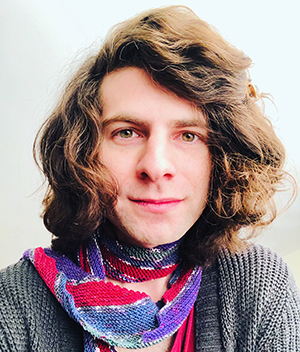Poetry that Refuses Neutrality: Quinn Stacey in Conversation with Daniel Sarah Karasik

Daniel Sarah Karasik, whose poems "Against the Law" and "hustle" appear in The Malahat Review's summer issue #211, discusses formal vs. colloquial language, the ideological work of a poem, and the various processes of translation involved in writing and reading in their Q&A with Malahat Review screener Quinn Stacey. Read "Against the Law" here.
Daniel Sarah Karasik (they/them) is a writer in Toronto. Their recent poetry and critical prose appear in Briarpatch Magazine, Grain Magazine, The Puritan, and elsewhere. They are a co-founder and coordinator of the network Artists for Climate & Migrant Justice and Indigenous Sovereignty.
"Against the Law" and "hustle," your poems in issue 211, very effectively employ language that is both literary, or scholarly, and colloquial (e.g., "phallic / in its sophistries, its stern Socratic certainties / about the weight of argument / in settling or discerning right" and "I took some pretty selfies in tight panties"). How do you manage the different approaches to word choice, and how do you know when the balance is such that your tone is how you intended?
I think I mix those registers more or less unconsciously, though I guess there's a part of me that's anxious about elevated diction, worried it'll alienate or feel like some weird claim to dogmatic authority, and wanting to subvert it a bit. In "Against the Law" in particular, I'd say those shifting registers in the language sort of reflect what the poem is thinking through: the law's claims to authority, how the law legitimizes colonial, cishet-patriarchal power through a formalism that can seem orderly and rational but disguises brute domination. The poem's playful moments of undercutting its own formality can be read as part of its larger critique of the law's violent self-seriousness.
Although the two poems are quite brief (only three pages total as they appear in the magazine) they give a very strong impression of you, the poet, and your personality. Do you think it's possible for a reader to know you after reading such a small excerpt of your work? Do you endeavour to be known by the reader?
Please see the following meme!! https://knowyourmeme.com/memes/the-mortifying-ordeal-of-being-known
I think it's possible for a reader of those poems to know a bit about me as I was thinking and feeling (and dressing) at a particular moment in time, but I don't believe you can really know somebody through their writing alone, nor do I feel like that's necessary for the writing to be useful or pleasurable. Given the various processes of translation involved in writing and reading (experience translated into consciousness, consciousness translated into poem, poem filtered through the reader's different experiences and consciousness), it seems unlikely to me that the self the author invents through writing combined with the self the reader perceives through reading will add up to an actually existing person.
Do you think your poetry plays, or could play, any part in contemporary politics and do you think a poet can be a political figure in 2020? When you set out to write a poem, do you see your work as being a part of a larger movement in our culture?
I tend to think all poetry expresses the ideology of a specific material politics. A lot of the time those ideological commitments go unnamed, since a lot of poetry expresses a liberal humanism that depoliticizes experience, or politicizes it in ways that don't stage any confrontation with racial capitalism and the state. But I feel like you can generally tease out the ideological work a poem is doing, even in its disavowals of politics. I guess I'm interested in poetry that refuses this false (unavailable) neutrality and aligns itself intentionally with movements for liberation, i.e. movements that contest the capitalism, colonialism, and imperialism that go mostly unchallenged by liberal humanist politics/poetics. I don't think it really matters if a poet is a "political figure" per se; I don't think it's helpful for poets (or really anybody) to be political celebrities or figureheads. But I think it's possible and good for poetry to affirm its ideological commitments, however obliquely, and contribute to shifting political consciousness in whatever partial, contingent way.
Are you primarily a poet? Do you write in any other forms? Your syntax suggests to me that you also write creative prose.
I've written in a bunch of different forms, yeah! These days I've been writing mostly poetry, speculative fiction (a novel), some political journalism, and songs. Each of those forms has felt most urgent to me at different times. I've also written for performance.
I am always interested in other writer's methods for writing rough ideas and keeping them organized. Notebook? Smartphone audio recordings? Memory?
Twitter drafts. :)
Quinn Stacey
* * * * * * * *









